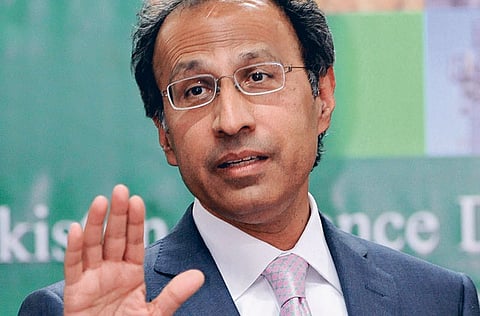Pakistan's working class a reason to exhale
Provides tax relief to salaried people along with a 50% increase in pay

Dubai: Salaried people experienced major relief after the Dh140 billion ($38.3 billion) Pakistan budget announced on Saturday for the 2010-2011 fiscal year starting July 1.
Pakistani Finance Minister Abdul Hafeez Shaikh said the budget provides tax relief to salaried people, in addition to a 50 per cent increase in basic pay for all government employees.
The allowance will benefit nearly two million civilian employees and defence personnel employed by the federal government.
An economic survey for the past fiscal year had put the rate of inflation during the outgoing fiscal year at more than 13 per cent compared to nearly 24 per cent during 2008-2009.
Another major relief was an increase in the exemption from income tax from Rs200,000 (about Dh9,180) to Rs300,000.
Internal resource mobilisation has been estimated at Dh75.9 billion while the balance is projected to be netted by foreign aid, foreign and local borrowing.
The total size of the budget for the next year has been fixed at Rs3.259 trillion, a 10 per cent rise, with a budget deficit of Rs685 billion, or four per cent of gross domestic product (GDP). The social development allocation is Rs766.5 billion.
"People are at the heart and centre of this budget," Shaikh said in his budget speech.
"The best relief package that a government can give to its people is to reduce inflation because it is detrimental to poor sections of the society," he added.
"We are seeing the beginning of recovery. Inflation has been checked from a peak which had reached 25 per cent," he said. In April, the inflation rate was 13.3 per cent.
"In GDP a turn around is being seen, it has reached 4.1 per cent, our foreign currency reserves have reached $16 billion, remittances have increased to $8.5 billion," Shaikh said.
The budget sets a tax revenue target of Rs1.779 trillion, compared to last year's Rs1.494 trillion — an increase of about 19 per cent. The Federal Board of Revenue has been given a collection target of Rs1.667 trillion which is 20 per cent higher than the current year's target of Rs1.380 trillion.
Self-reliance
The Finance Minister said the budget aimed at seven major objectives — protecting economic recovery, controlling inflation, achieving self-reliance through domestic resource mobilisation, targeted social protection regime for poverty reduction, controlling losses of public sector entities, reducing unemployment, improving investment climate and overcoming energy shortages.
The FBR's revenue target of Rs1.667 trillion includes direct taxes of Rs657.7 billion and indirect taxes of Rs1.121 trillion. Direct taxes are about 22 per cent higher than the current year's revised estimate of Rs540.4 billion. Indirect taxes are about 19 per cent higher than the current year's Rs943 billion. Indirect taxes include Rs675 billion sales tax, Rs153 billion federal excise and Rs181 billion customs duty.
Against a total outlay of Rs3.259 trillion, the new budget forecasts total revenue at Rs2.574 trillion, leaving a fiscal deficit of Rs685 billion.
The next year's current expenditure has been estimated at Rs1.998 trillion against the current year's original estimate of Rs1.699 trillion, up about 17.6 per cent. This includes expected defence expenditure of Rs442 billion which is 17 per cent higher than the current year's revised estimate of Rs378 billion.
An amount of Rs873 billion has been set aside for debt servicing, compared to the current year's revised estimate of Rs815 billion, showing an increase of about seven per cent.


